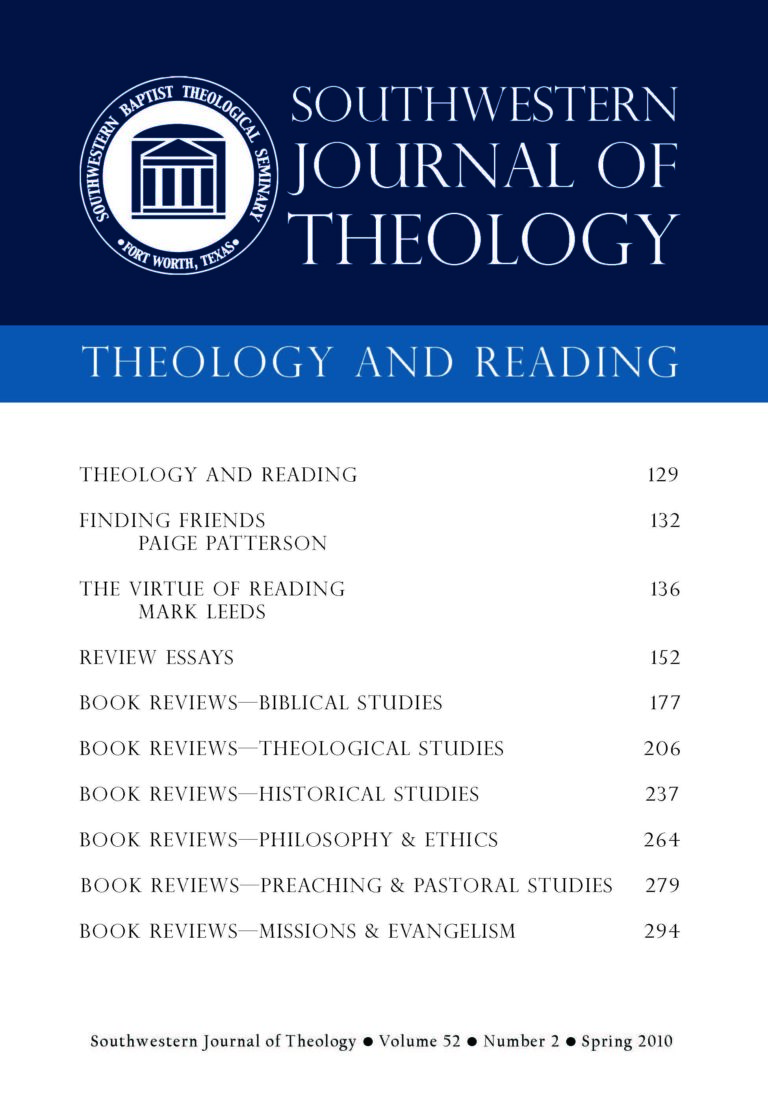
Theology and Reading
Southwestern Journal of Theology
Volume 52, No. 2 – Spring 2010
Managing Editor: Malcolm B. Yarnell III
By Merkle, Benjamin L. Grand Rapids: Kregel, 2008. 270 pages. Softcover, $17.99.
Benjamin L. Merkle, graduate from Southern Baptist Theological Seminary in 2000, was a professor of New Testament at Malaysian Baptist Seminary (2002–2008) and is currently teaching New Testament and Greek at Southeastern Baptist Theological Seminary. His PhD dissertation on the elder-overseer as one church office has been published by Peter Lang (NY, 2003) in the Studies in Biblical Literature series. 40 Questions about Elders and Deacons bolsters Merkle’s growing expertise in ecclesiology.
This book is divided into forty questions under three main sections: offices in general, the office of elder, and the office of deacon. The first section argues that the New Testament supports congregationalism and teaches only two church offices (i.e. elder and deacon). The second section (on eldership) covers the historical and biblical backgrounds of elder-overseer, particularly contending for the one and same office of elder and overseer (Question 9). While aptly analyzing the qualifications of the elder-overseer as given in 1 Timothy 3 and Titus 1, the author unambiguously holds to the plurality of male eldership as the biblical form of church leadership. Merkle also suggests practical ways to choose, ordain, pay, and even remove elders. The third section covers the office of deacon, specifically about its origins, qualifications, roles, and genders.
Merkle writes with the intention to instruct the churches; therefore, the language he uses is appropriate for all readers having avoided difficult theological jargons. The question-and-answer style of the book suggests the conciseness and readability of the book without diminishing quality of content. This book contains helpful information biblically and practically to help the church to form a New Testament church. For example, after establishing the biblical principle for a plural-male-elders model (Questions 7–20), Merkle gives some practical guidelines to help the churches to think through some advisable (not absolute) ways for initiating, maintaining, and improving a plural eldership (Questions 21–28). It is crucial to note some biblical, as well as practical, ideas on eldership which are much neglected by the churches today: the plural-male eldership is the biblical model of leadership; all elders are pastors, and vice versa, even though some are not “paid” by the church; all elders must be able to teach the Word and doctrine; the non-staff elders have equal authority and the same roles as the paid (or full time) elders. Apparently, Merkle set out to restore the churches today to pluralelder leadership.
Merkle’s presentation is fair and objective. For instance, when he discusses the gender issue in regard to elder leadership (Questions 18–20), Merkle lays out biblical, theological, and practical arguments from various perspectives. This, in fact, helps readers to be educated concerning the major arguments on controversial issues. His intention is simply to enable them to distinguish what and why to support or reject certain positions. Nevertheless, Merkle seems to leave some issues ambiguous. For instance, while the author holds to the theological principle that women are neither to teach the Word in a congregated worship context (144), nor to exercise “any authority in positions of leadership in the church (149),” Merkle gives an impression that women are not to be in any ministry pertaining to teaching or leadership roles in the church. It seems ambiguous, for example, whether spiritually gifted and mature women are to teach the Bible in the church context to young or senior adult males who are non-Christians or who have just become new believers. This book does not seem to distinguish or define practically if women are to be prohibited from all teaching or leadership roles, besides eldership or deaconship. Consequently, Merkle is also equivocal about whether women may be allowed to hold teaching and leadership positions over men outside worship and church contexts, such as in seminaries, Christian colleges, or even Christian homes.
Nonetheless, Merkle commendably puts his bold convictions into workable application for the churches. Specifically, the emphasis on all elders’ ability to teach and also on the deacons’ responsibility to “provide logistical and material support so that the elders can concentrate their efforts on the Word of God and prayer” (238) is a particularly crucial rubric for modern churches to apply. Today, churches frequently expect the elders/pastors to do other administrative and ministerial works, in addition to teaching and preaching the Word. Subsequently, many pastors experience physical or emotional burnout and in the meantime are not able to lead the people with the Word. Merkle’s book has made a major contribution not only to Christian scholarship, but also to Christian churches worldwide.





